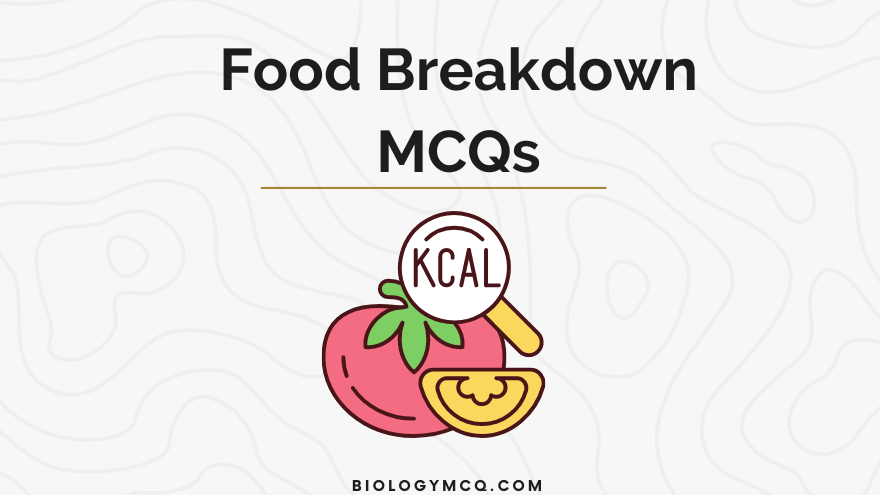Study and Learn with 1000s of Biology MCQs
Food Breakdown MCQs

Here is collection of food breakdown multiple-choice questions (MCQs) delves that cover topics such as the organs involved, enzyme functions, nutrient absorption, and the end products of digestion. Whether you’re studying for an exam or seeking to deepen your understanding of human physiology, these MCQs offer valuable learning opportunities for students and enthusiasts alike.
Let’s dive into the MCQs below and expand your knowledge of digestive processes!
MCQ on Food Breakdown
examples of bulk feeders include _____ ?
Eagles
People
Frogs
snakes
All of these
All of these
_____ take big bites out of food
Fluid feeders
Substrate feeders
Filter feeders
Bulk feeders
Bulk feeders
_____ strain liquids to capture tiny particles suspended in the fluid
Fluid feeders
Substrate feeders
Filter feeders
Bulk feeders
Filter feeders
Food breakdown is the process by which complex molecules in food are broken down into simpler compounds that the body can absorb and utilize for energy and nutrients.
_____ suck nutrient-rich fluids from other organisms
Fluid feeders
Substrate feeders
Filter feeders
Bulk feeders
Fluid feeders
_____ live right in or on their food and eat as they move through it
Fluid feeders
Substrate feeders
Filter feeders
Bulk feeders
Substrate feeders
Which of these is a filter feeder?
clam
Aphid
Mosquito
earthworm
clam
Which of these is a fluid feeder?
clam
eagle
Mosquito
earthworm
Mosquito
Which of these is a substrate feeder?
clam
eagle
Mosquito
earthworm
earthworm
_____ are often parasites that live inside a host and use the host’s fluids as a source of food
Fluid feeders
Substrate feeders
Filter feeders
Bulk feeders
Fluid feeders
_____ occurs when an animal takes food into its digestive tract
Ingestion
Digestion
Defecation
None of these
Ingestion
_____ occurs when the animal’s body gets busy breaking down the food
Ingestion
Digestion
Defecation
None of these
Digestion
_____ physically breaks down food into smaller and smaller pieces
Mechanical digestion
Chemical digestion
Elimination
absorption
Mechanical digestion
_____ uses enzymes and acids to break down chewed or ground-up food into even smaller pieces
Mechanical digestion
Chemical digestion
Elimination
absorption
Chemical digestion
_____ occurs when cells within the animal move small food molecules from the digestive system to the insides of the cells
Mechanical digestion
Chemical digestion
Elimination
absorption
absorption
_____ occurs when material that can’t be digested passes out of an animal’s digestive tract
Mechanical digestion
Chemical digestion
Elimination
absorption
Elimination
_ break down food molecules
glycolysis
Krebs cycle
Both of these
oxidative phosphorylation
Both of these
_ transfers the energy from the food molecules to ATP
glycolysis
Krebs cycle
Both of these
oxidative phosphorylation
oxidative phosphorylation
In glycolysis, cells break glucose down into _
pyruvate
Methanol
Carbon dioxide
Carbonic acid
pyruvate
There are __ carbon atoms in glucose
12
3
6
16
3
There are __ carbon atoms in acetyl-coA
2
3
6
16
2
In glycolysis, pyruvate is broken down into a two-carbon molecule called?
Methanol
Carbon dioxide
Carbonic acid
acetyl-coA
acetyl-coA
which occurs in the matrix of the mitochondrion?
glycolysis
Krebs cycle
oxidative phosphorylation
All of these
Krebs cycle
In _, breaking down of acetyl coA into carbon dioxide occurs
Krebs cycle
glycolysis
oxidative phosphorylation
All of these
Krebs cycle
In krebs cycle, breaking down of _ into carbon dioxide occurs
Methanol
Carbon dioxide
Carbonic acid
acetyl-coA
acetyl-coA
In krebs cycle, breaking down of acetyl-coA into _ occurs
Methanol
Carbon dioxide
Carbonic acid
acetyl-coA
Carbon dioxide
which occurs in the inner membrane or cristae of the mitochondrion?
Krebs cycle
glycolysis
oxidative phosphorylation
All of these
oxidative phosphorylation